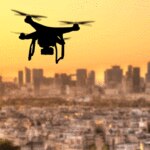Drones conquer the US skies
New US legislation eases the law applicable to unmanned aircraft, although questions of the security and privacy of commercial operations that use drones to deliver products remain up in the air.

The US skies are opening up to drones for commercial use. The United States has announced new regulations applicable to unmanned aircraft. On June 21 the Federal Aviation Administration (FAA) published new rules applicable in the United States that greatly reduce limitations on drones weighing less than 25 kilos.
Previously, drone users had to have a pilot's license and request flight authorizations. Now these requirements have been lifted: drones will have to be registered and users will have to pass a skills test every two years. Authorization will still be required in sensitive areas, particularly those located close to airports, but the Administration has undertaken to respond to applications within ten days.
Drones for commercial use will have to fly not higher than a maximum limit of 122 meters (400 feet) (compared with the 150 meters in France or 120 meters in Spain), and remain within the operator's line of sight without moving over densely populated areas.
The announcement of this regulation has been well received by all the parties involved. "I regard it as a significant milestone," said Brian Wynne, president of AUVSI (the Association for Unmanned Vehicle Systems International), which represents the main companies in the sector. "This is just the beginning of this process. And obviously we're going to continue to work closely with private sector entities... because the President has made clear that the future success of our economy will depend on our ability to continue to innovate," highlighted Josh Earnest, President Obama's Press Secretary.
However, the new rules do not mention the question of deliveries using drones. Amazon, Alphabet (formerly Google), Walmart and the Chinese company Alibaba have major projects underway and the FAA has already awarded licenses for some of these companies to carry out tests. The White House has noted that talks are already being held to develop regulations in this area.
The FAA has more or less opened the door by indicating that the procedures for obtaining a waiver (the government agency has already granted thousands) will be simplified. In fact, currently it would be premature to legislate on the question of drone deliveries. The operators still do not have a system of automated management of low-altitude air traffic, on which NASA is working with multiple startups. They have still not been developed for major distribution companies.
The rules also do not deal with the issue of security and privacy, which as this editorial in The New York Times notes, is a matter of concern: “But as drones have become smaller, cheaper and more numerous — some popular consumer models sell for less than $1,000 — policy makers have had to address potential problems. These machines can obviously be put to good use - say, inspecting cellphone towers, shooting movies or compiling multidimentional real-estate portfolios. They can also be used to snoop on people and harass them. And they can threaten other aircraft."
The US daily highlights that "some regulation of the private and commercial use of drones thus seems inevitable. The task for regulators is how to protect privacy and promote safety without infringing on the First Amendment rights of citizens and businesses that wish to use drones for legitimate purposes, like photography or news gathering."
It notes that "many privacy advocates are also worried that drones used by businesses will collect information like wireless signals emitted by cellphones that could be used to determine people’s locations. One marketing company did just that last year in Los Angeles." Nevertheless, it points out that "The public’s desire for clear rules is understandable. Still, policy makers should not make it so difficult to use drones that they end up limiting the First Amendment rights of filmmakers, activists and journalists.”